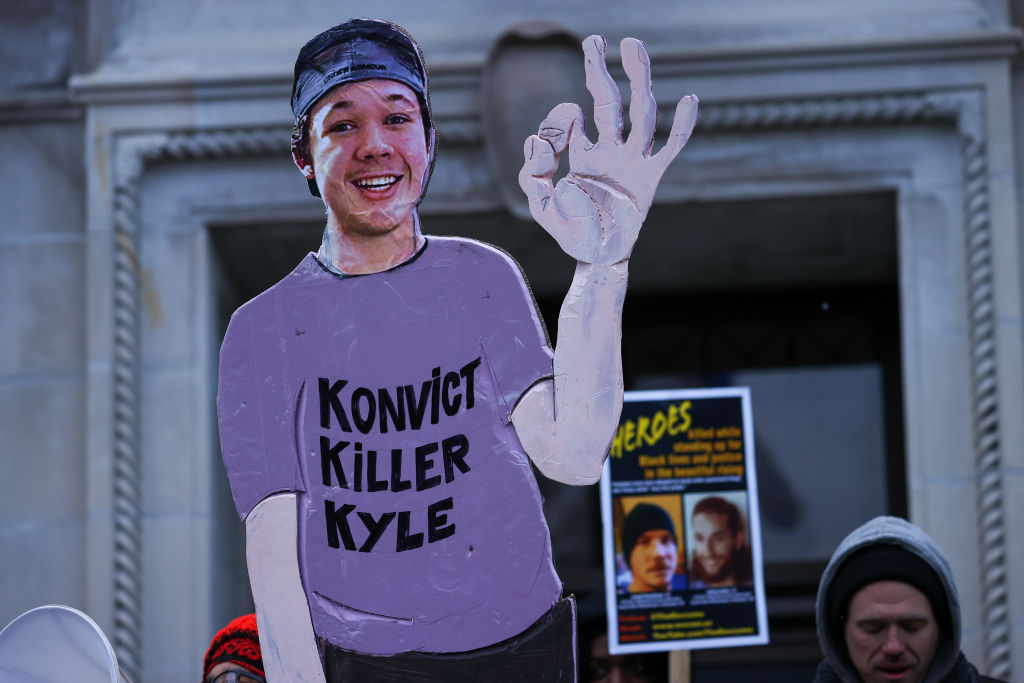What Does It Mean When Juries Take A Long Time Deliberating?

A person holds a Kyle Rittenhouse’s cardboard mock-up outside of the Kenosha County Courthouse on the third day in the trial of Kyle Rittenhouse on November 18, 2021, in Kenosha, Wisconsin. | Source: Anadolu Agency / Getty
Friday begins the fourth day of deliberations for the jury that will decide the fate of Kyle Rittenhouse, the white teenager accused of murdering two people he shot and injuring another at a racial justice protest in Wisconsin last year.
But what may have seemed like an open-and-shut case has been anything but that as jurors have now taken more than 24 hours to deliberate, which seems like an eternity compared to some other recent verdicts returned by juries in other high-profile murder cases.
So what exactly does it mean when juries take longer than expected?
The answer isn’t really that clear, but the apparent consensus across social media is that, at least in this case, it bodes well for Rittenhouse, 18, who has pleaded not guilty and maintained he was defending himself after being ambushed in a deadly confrontation during a protest that stemmed from an officer with the Kenosha Police Department shooting Jacob Blake, an unarmed Black man, in the back multiple times at close range. Days later, Rittenhouse’s mother drove him from their home in Illinois to Kenosha so he could purportedly patrol the streets while armed with an assault rifle in what he claims was an effort to protect local businesses from looting rioters.
For this jury, in particular, one legal scholar told the New York Times that the length of time Rittenhouse’s jury is taking may not actually mean anything other than the panel is simply doing its due diligence in a case that has captured international attention.
“You can’t read anything into it in terms of the length of the deliberations other than it’s so intensely stressful for the parties,” Ion Meyn, an assistant professor at the University of Wisconsin-Madison Law School, said to the Times.
However, when speaking in general terms, lengthy jury deliberations can mean something completely different.
“It can just polarize into two groups who are taking opposing views,” Deanna Kuhn, a professor of psychology and education at Columbia University’s Teachers College who has researched juries and how they reach decisions, told the HuffPost in 2017 in reference to Bill Cosby’s criminal trial for sexual assault.
In that case, a jury took more than six days only to ultimately declare a mistrial.
But if there is one rule surrounding lengthy jury deliberations, it’s that there is seemingly no rule at all. No rime nor any reason.
However, it’s worth noting that it took a jury just 10 hours to find former Minneapolis police officer Derek Chauvin guilty of murdering George Floyd this past April. Similarly, it took a jury less than four hours to acquit O.J. Simpson of murder charges back in the 1990s. And in the Michael Jackson child molestation case, a jury needed about 32 hours to find the singer not guilty.
Legal expert Dan Abrams said in 2005, around the time of Jackson’s case, that long deliberations suggest an acquittal or mistrial are on the horizon.
“As time passes, it at least says that these jurors are not just saying ‘Forget about it. This was a nothing case. It should have been thrown out of court,’” Abrams told NBC News.
SEE ALSO:
Kyle Rittenhouse Juror Who Joked To Cop About Jacob Blake Shooting Gets Dismissed From Case
America, Is That You? Just 1 Black Juror Selected In Murder Trial For Ahmaud Arbery’s Killers
[ione_media_gallery src=”https://newsone.com” id=”4243944″ overlay=”true”]


